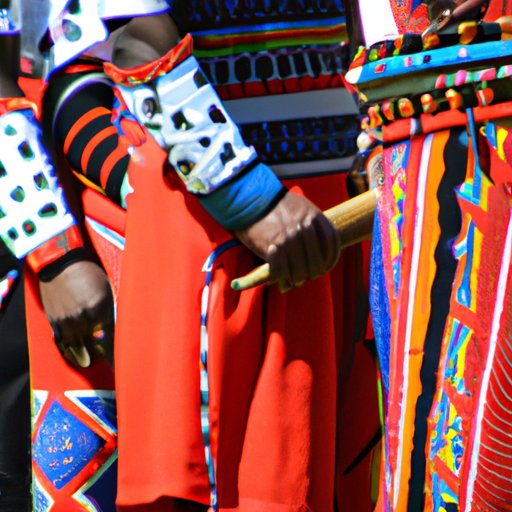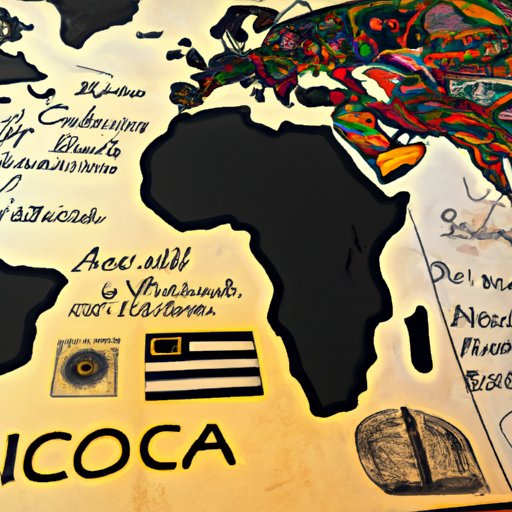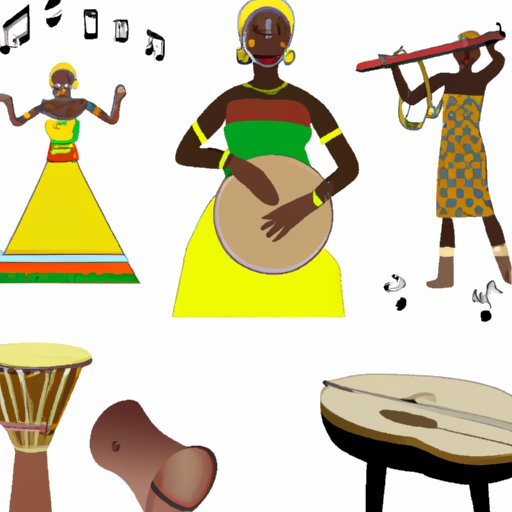Introduction
Africa is a vast continent with a rich diversity of cultures and traditions. From its vibrant music and art to its distinct clothing styles and religious customs, each African country has something unique to offer. In this article, we will take a comprehensive look at the various aspects of African cultures, including music, art, clothing, food, religion, and social structures.
Exploring the Significance of African Art and Music in Shaping Culture
African art and music are two of the most important components of African culture. They provide insight into the beliefs, values, and customs of the people living in different regions. In addition, they can be used to trace the history of African civilizations.
Types of African Music
African music is highly diverse and can vary greatly from region to region. Common musical instruments include drums, xylophones, marimbas, and koras. Popular genres of music include highlife, Afrobeat, juju, and makossa. African music has been heavily influenced by other cultures, such as European and American music.
Types of African Art
African art is an expression of the diverse cultures of the continent. It includes sculptures, masks, jewelry, pottery, textiles, and other decorative items. African art is often characterized by bold colors, intricate patterns, and abstract designs. It is often used to tell stories and express beliefs.
Role of Art and Music in African Cultures
Art and music play a vital role in African cultures. They are used to communicate stories, celebrate traditions, and commemorate special occasions. African art and music also help to preserve and pass down cultural practices from one generation to the next.

Traditional Clothing and Festivals Across Africa
Traditional clothing and festivals are two of the most visible aspects of African culture. Different countries have their own distinct styles of clothing and festivals, which reflect their unique histories and customs.
Types of Traditional Clothing
Traditional African clothing varies from region to region. Common garments include dashikis, boubous, and kaftans. Some countries also have specific types of headdresses that are worn for special occasions. Many of these garments are handmade using natural materials such as cotton and leather.
Popular Festivals Celebrated in Africa
Festivals are an important part of African culture. Popular festivals include the Festival of the Dhow Countries in Tanzania, the Gnaoua Festival in Morocco, and the Timkat Festival in Ethiopia. These festivals typically involve singing, dancing, and feasting.
Role of Clothing and Festivals in African Cultures
Clothing and festivals are integral parts of African cultures. They are used to mark important events, such as weddings and funerals, and to celebrate the changing of the seasons. In addition, they provide a way for people to express their identity and pride in their heritage.
Food, Religion and Social Structures: How African Cultures Differ from Each Other
African cultures are not only diverse in terms of art, music, clothing, and festivals, but also in terms of food, religion, and social structures. Each African country has its own unique set of customs and traditions.
Variety of Foods Consumed in Different African Countries
African cuisine is incredibly varied and can differ significantly from one country to the next. Common staples include millet, sorghum, maize, yams, and cassava. Popular dishes include couscous, fufu, jollof rice, and plantains. African cuisine is also heavily influenced by European, Asian, and Middle Eastern cooking styles.
Major Religions Practiced in Africa
Religion plays a major role in African cultures. The majority of Africans practice Christianity, Islam, or traditional African religions. Other smaller religious groups include Hinduism, Buddhism, and Judaism.
Impact of Religion on African Cultures
Religion has had a profound impact on African cultures. For example, many religious ceremonies and rituals take place throughout the year. In addition, religious beliefs and values shape the way people live their lives.
Social Structures Across Africa
African societies tend to be hierarchical in nature. Common social structures include clans, tribes, chiefdoms, and kingdoms. Within these structures, people are organized according to age, gender, and social status.
Differences Between African Cultures
Despite the many similarities between African cultures, there are also some notable differences. For example, some African countries practice polygamy, while others do not. Similarly, some African cultures are more conservative than others when it comes to gender roles and sexuality.

Looking at the Impact of Colonialism on African Cultures and Society
Colonialism has had a long-lasting effect on African cultures and societies. It has shaped the political, economic, and social landscape of the continent.
Historical Overview of Colonialism in Africa
European powers first began colonizing parts of Africa in the late 19th century. By the early 20th century, much of the continent had been divided among the European powers. This period of colonization had a devastating impact on African cultures and societies.
Impact of Colonialism on African Societies
Colonialism brought many changes to African societies. It disrupted traditional ways of life, destroyed local economies, and weakened traditional political structures. In addition, colonial rule imposed foreign languages, religions, and laws on African peoples.
Long-Term Effects of Colonialism on African Cultures
The effects of colonialism on African cultures have been both positive and negative. On the one hand, colonialism introduced new technologies, systems of government, and educational opportunities. On the other hand, it also caused deep divisions among African peoples and led to the suppression of traditional cultures.
Conclusion
African cultures are incredibly diverse and complex. They encompass a wide range of art, music, clothing, food, religion, and social structures. In addition, the legacy of colonialism continues to affect African cultures and societies today. As the continent continues to evolve, it is important to acknowledge and celebrate the unique cultural traditions of each African country.
(Note: Is this article not meeting your expectations? Do you have knowledge or insights to share? Unlock new opportunities and expand your reach by joining our authors team. Click Registration to join us and share your expertise with our readers.)
